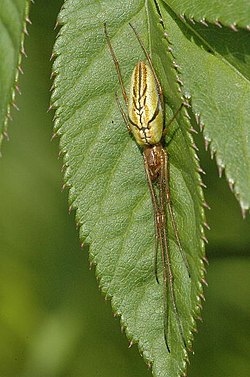200 yard spider web found in Lake Tawakoni State Park, East Texas
Saturday, September 1, 2007

Much discussion has been garnered over a massive 200 yard spider web discovered in Lake Tawakoni State Park, Eastern Texas, United States.
The web is stretched across a 200 yard section of a nature trail in the park, covering the ground, bushes and even seven sizeable trees.
Donna Garde, superintendent at the park, described the web and its effectiveness: "At first, it was so white it looked like fairyland. Now it's filled with so many mosquitos that it's turned a little brown. There are times you can literally hear the screech of millions of mosquitoes caught in those webs."
Mike Quinn, an invertebrate biologist with the Texas Parks and Wildlife Department, described a high level of interest in the web: "I've been hearing from entomologists from Ohio, Kansas, British Columbia, all over the place." It was Quinn who originally posted images of the web on the internet, sparking the intense interest.
There is much debate amongst experts over the reasons for the web's construction, with some believing it was created by social spiders living as a colony, and others suggesting it is possibly a system of mass dispersal, with the spiders building webs in order to spread out. There is also uncertainty over the species of spider responsible, although it is known that smaller webs of an otherwise similar nature have been discovered elsewhere in the park, on another trail. It is thought that the species is likely a member of the genus Tetragnatha.
John Jackman, a professor and extension entomologist for Texas A&M University and author of A Field Guide to the Spiders and Scorpions of Texas, said that the phenomenon is not particularly unusual and that reports are submitted to him every few years detailing similar webs. "There are a lot of folks that don't realize spiders do that," Jackman said. "Until we get some samples sent to us, we really won't know what species of spider we're talking about."
However, other experts disagree over the unusual nature of the discovery. "From what I'm hearing, it could be a once-in-a-lifetime event," said Herbert "Joe" Pase, a Texas Forest Service entomologist. "It's very, very unusual."
The web is expected to begin to disintegrate soon, as the spiders die out over Autumn. "It would make a good Halloween set, wouldn't it?" said park ranger Freddie Gowin, who found the giant web while mowing last month. However, it is not anticipated to survive until October 31st.
Sources
- Bill Hanna. "Heads spinning over 200-yard spider web" — Fort Worth Star-Telegram, August 31, 2007
- "Giant Spider Web Spins The Heads Of Experts" — KLTV, August 30, 2007

